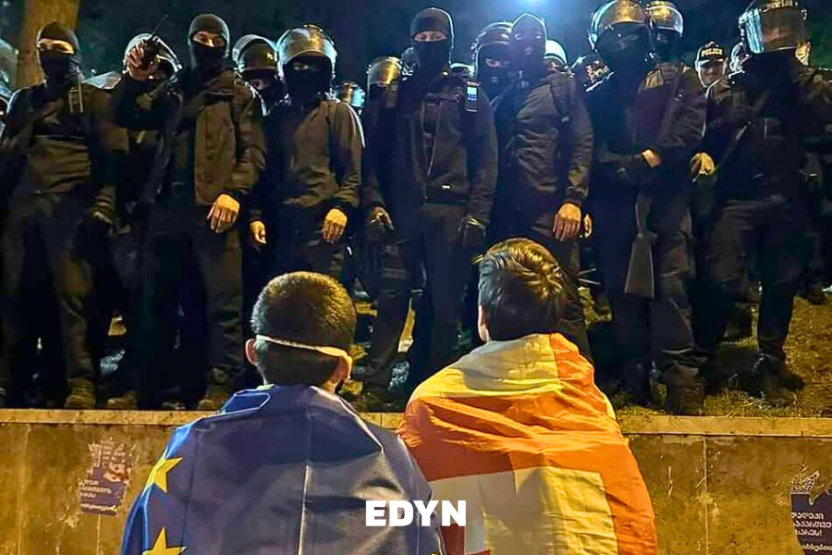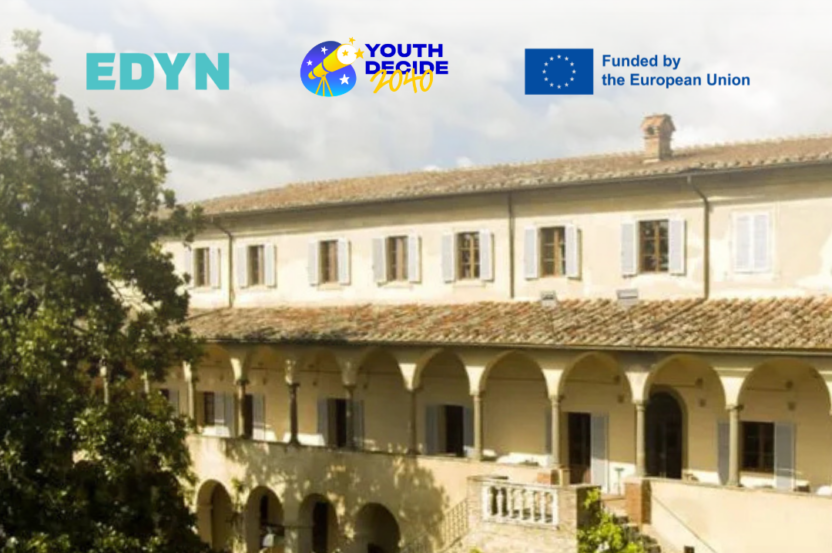EDYN Features are short articles where our members share their thoughts on key issues like youth engagement, disinformation, democracy, EU enlargement, and conflict resolution. The goal is to spark conversations, highlight different perspectives, and to help us all think more deeply about what’s happening in the world.
Want to be a part of the series? Write a message to [email protected] and share your ideas!
Threats to Democracy in Georgia: Youth’s Perspective
 |
Written by Dr. Giorgi AgirbaiaPresident of EDYN
|
In recent months, Georgia has faced a sharp rapid decline in democracy and fundamental freedoms as the government tightens its grip on power for the 4th term. The adoption of the Russian-style ‘foreign agents’ law in May 2024, followed by the allegedly fraudulent elections on October 26th, has drawn strong criticism from OSCE and local/international observers.
On November 28th, the self-proclaimed PM announced a halt to Georgia’s EU integration until 2028, sparking mass protests.
The police regime has intensified repression, targeting the opposition, journalists and activists with house searches, over 2,000 administrative trials, and fines exceeding 5 million GEL. Despite violent crackdowns, including the torture of over 350 detainees and the imprisonment of 60 innocent people, Georgians have protested nonstop for over 119 days (as of today, 27.3.2025).
As a democracy activist and the President of EDYN, like many other colleagues and citizens in Georgia facing repressive laws, I was also subject to an administrative court trial.
The Georgian Dream party seems to be taking a page out of the Kremlin’s playbook, forging closer ties with Iran and China whilst growing apart from the EU and US. Deep social-political crisis isn’t only a threat to democracy in Georgia, but also an attack to European values, fundamental freedom, security in Caucasus and the wider Black Sea region.
- The EU and member states must go beyond mere statements of concerns and travel bans for diplomatic passport holders by imposing targeted sanctions on officials responsible for these repressive measures and ensuring the European Parliament’s February 13th resolution on Georgia’s political situation is followed by concrete action. The Baltic States, the UK and Ukraine – which sanctioned members of the ruling government – are good examples of where responsible people’s lists can be wider.
- The United States could accelerate the process of Georgian citizens’ victory over a repressive police regime by expanding stronger targeted sanctions and advocating for H.R.243 – Georgian Nightmare Non-Recognition Act and MEGOBAR ACT introduced by Congressmen R. Joe Wilson, D.Steve Cohen.
- International organizations and democracy-supporting foundations should increase funding for independent media, legal aid for persecuted activists, and platforms that empower Georgian citizens to resist authoritarianism.
- Western leaders must engage directly with Georgian civil society and opposition groups, ensuring that pro-democracy forces receive meaningful support rather than diplomatic statements. Otherwise, it will lead to a massive brain drain, exile of critical journalists, CSO leaders and opposition leaders.
Beyond Georgia, the implications of this democratic backsliding are profound given Georgia’s role and interest in global Geo-politics due to its location, considered as a bridge between Europe and Asia.
If the West fails to take proactive actions to ensure restoring democratic pathway, it risks emboldening authoritarian trends and undermining security across the Caucasus, wider Black Sea region and Europe at a time when Western allies must demonstrate unity against authoritarian aggression. Russia and its allies will not miss the opportunity to destabilize the region through Georgia.
Georgia is at the most critical crossroads in recent history, and the actions of the international community will determine whether it remains on a European path or falls into autocratic rule. Now is the time for coordinated pressure, diplomatic isolation, sanctions on repressive leaders, and unwavering solidarity with Georgia’s democratic movement. The cost of inaction is not just the loss of one nation’s freedoms—it is the erosion of democratic resilience in an already fragile region. The world must stand with Georgia’s citizens before it is too late. This is alarming and needs urgent reactions and fast solutions, mechanisms to ensure Georgia stays on the European track as a reliable democratic partner in the Eastern neighborhood and Caucasus region.



